Part 13: The Castratus and the Bull
Chapter 13 – The Castratus and the Bull – 1223 to 1245In the vast and unchanging grasslands of the east, Khan Tolui has led the Mongols into glorious victory after victory, quickly pushing his borders outward in every direction. By 1223, he's managed to unite the entirety of the Steppe and integrate almost all other nomadic hordes, and with that he faced a momentous decision.
Under his leadership, the Mongol Empire had conquered vast swathes of China and pushed deep into Persia, but the going was about to get much tougher. In the Far East, the Great Song had rallied in southern China and were preparing for their first offensive against the Mongols, whilst in the West, the Muslims and Christians had put aside their petty differences and united in a defensive pact against Tolui. The Mongol Empire was vast and powerful, without a doubt, but its invincibility was about to be tested.
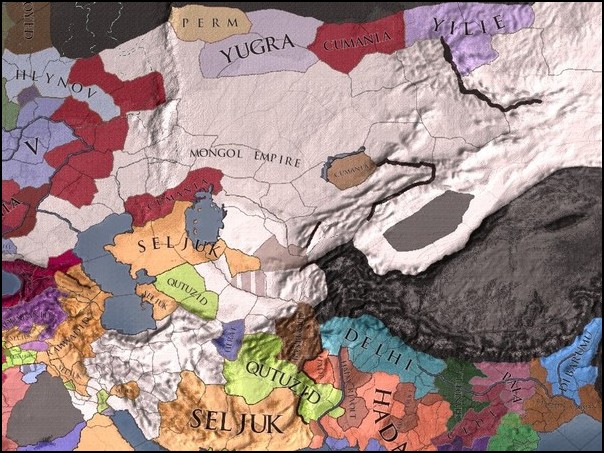
Immediately neighboring the Mongol Empire, the Grand Principality of Kiev has been struggling through a difficult few years, with several weak-willed rulers taking the throne in quick succession. Eventually, disagreements between the various members of the Rurikid dynasty erupted into a full-blown civil war, with Muscovy and Novgorod declaring independence from Kiev.

Finally, back in the west, the ever-present struggle between Muslims and Christians has once against escalated into war. Al Andalus managed to repel a crusade in the early 1220s, but that wasn’t enough to dissuade Christendom from striking back, waiting for the opportune moment to knock the Andalusians down a peg or two.
Sultan Fath, desperate to repair his public image, decided to declare war on a rebel Christian prince just to the north of Al Andalus. The rebels were small and disparate, so it was supposed to be an easy victory, but Fath had not expected the King of Castille to come riding to its defense. Even worse, the powerful Kingdom of France also decided to intervene against the Muslims, worried by the rapid expansion of the Jizrunid kingdom.
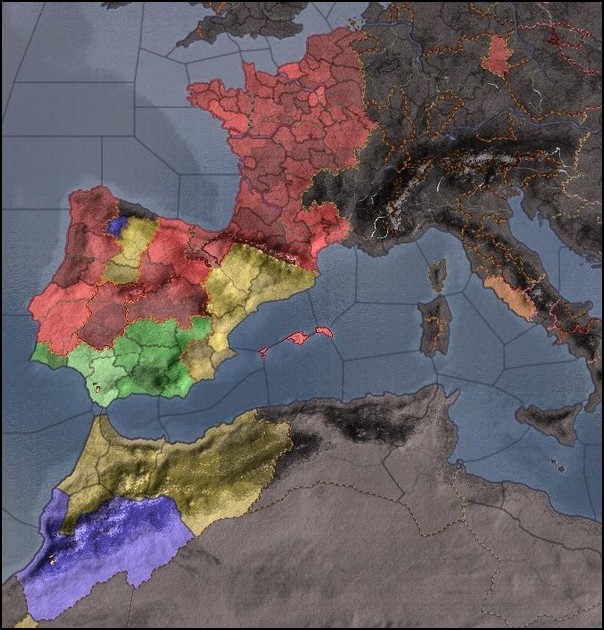
Fath had meant to lead his armies himself, but with Al Andalus suddenly facing such unfavourable odds, his council convinced him to recall the talented Musa to take command instead. And fortunately for the young kingdom, Musa agreed to depart his small home and simple life and rush to the frontlines, whilst the Sultan himself fled back to the comforts and safety of Cádiz.
Musa took command of the army in early 1225, and began the first march northward. It was the enemy who would strike the first blow, however, with 18,000 Castilians engaging 20,000 Andalusi at Trukillo.
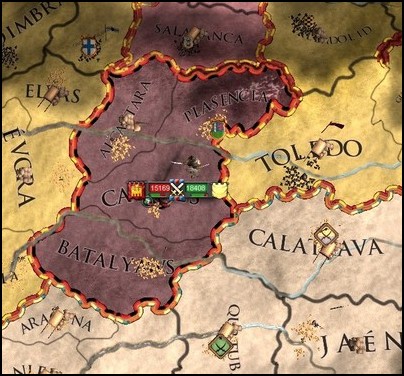
And the odds would only worsen, with reinforcements piling onto the battlefield and welling the strength of the Christian alliance to 32,000.
Luckily, Musa’s reputation as a capable commander had been well-earned. He didn't have much knowledge of fancy tactics and popular stratagem, but he did manage to deny the enemy a pitched battle, gradually drawing southward and convincing the enemy to pursue. This gradual retreat continued until Musa had reached friendly terrain - the rolling hills and wide grasslands of Caceras - and there he stood his ground. The two sides clashed under the hot summer heat of 1226, and after hours of thick fighting and inconclusive charges, Musa drew his wild card. Upon his command, half-a-dozen mounted parties thundered onto the battlefield, well-rested and fiery, and crunched into the flanks of the enemy army.
Three more hours and the battle was over, with more than half of the Christian force slaughtered in a stunning victory.
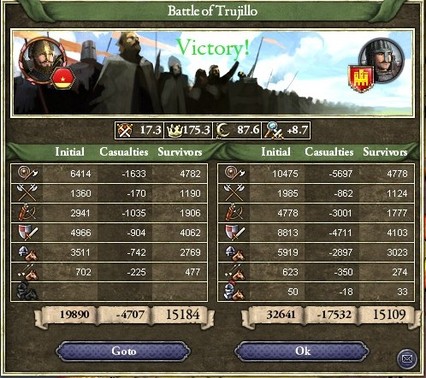
With that, the first laurels of the war are handed to the Muslims, with Musa seizing the initiative and pushing forwards within days of his victory. He deployed his forces to surround the strategic fortress of Batalyaws, where the Andalusi managed to force a breach and capture the citadel.
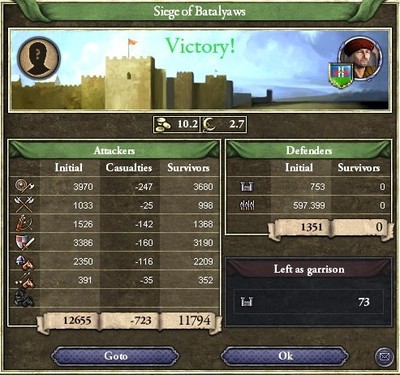
It wasn't much longer before Musa's advance was brought to a standstill, however, as the French finally descended from the north with 30,000 men. And as though that weren't bad enough, the Duke of Brittany had decided to contribute a sizeable force to the war as well, handing another 15,000 bodies to the enemy.
This wasn’t good news for the Andalusi, whose strength was already trickling away after a bloody battle and a difficult siege.
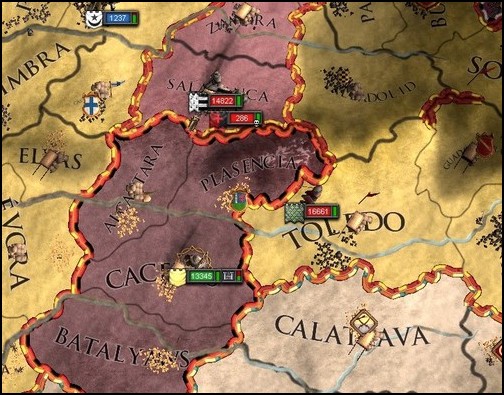
Musa was on the verge of full-blown retreat, but fortunately, the Almoravids arrived on the scene in the knick of time, bolstering the Muslim ranks with another 13,000 ghazis. The two armies clashed just weeks later, and the Jizrunid-Almoravid army was able overwhelm the Christians through pure numbers before any reinforcements could arrive, handing another decisive victory to the Muslims.
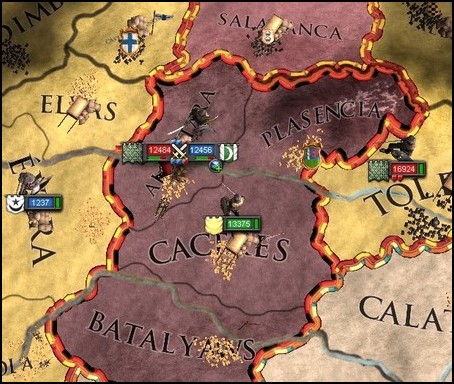

With that, the balance of the war was quickly shifting in favour of Al Andalus, and Musa was quick to capitalise on it, engaging a numerically-inferior Breton force near Niebla.
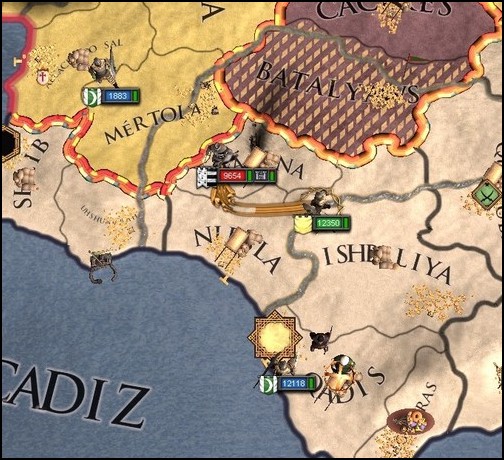
The skirmish quickly ended with another victory, but in the dying minutes of the battle, tragedy struck. The Almoravid Sultan Izri had been pursuing the fleeing Breton remnants when half-a-dozen arrows sprouted from his chest. The Sultan blinked once, before keeling over and dropping into the dust.
The new Almoravid sultan was nowhere near as interested in Iberian affairs as Izri had been, and after a few days of mourning, the Moroccan army pulled back to North Africa and exited the holy war.

Musa didn't have any time to mourn, however, with another 15,000 Frenchmen besieging the fortress of Calatrava. The commander rushed north, pinning the French between his army and the walls of Calatrava, where they were promptly decimated.

The commander didn’t stop there, however, pursuing the French to their base near Toledo. There they stood and met the Muslim advance, but once again, they broke and fled after suffering 2000 casualties in the space of a day. They had become wary, it would seem, after the massacre at Caceras - some Frenchmen had even begun calling Musa the "Bull of Caceres", for both his aggressiveness on the battlefield and his physically-imposing frame.
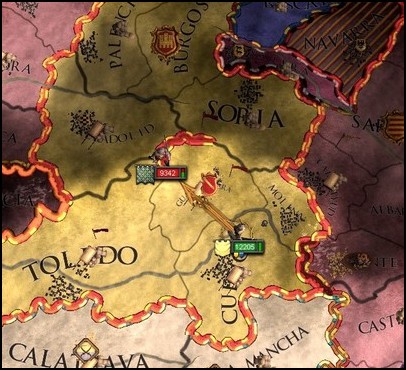
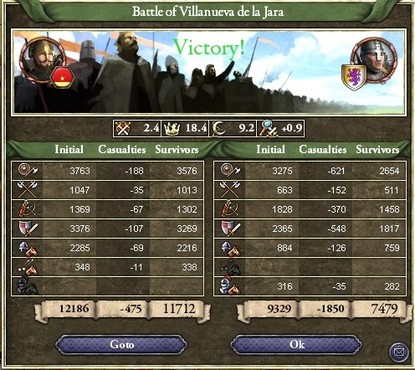
By now, however, the Andalusi army was a mere shell of its initial strength. Numbers and morale was dwindling as the war stretched on, so Musa decided to fall back and reinforce his position, but the French seemed to take this as a sign of weakness. Backed by reinforcements from Navarre and Asturias, they drove south and pinned the Andalusi at Balayaws.
The numbers were roughly equal this time, but Musa managed to repel the initial French incursion and hit back with a vicious counter-attack, fracturing their formation and sending them running.

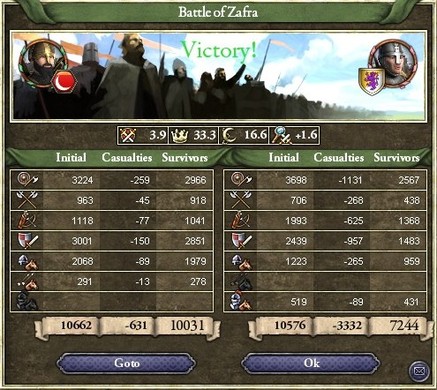
And with that, the rebel commanders and Castilian king finally agreed to cease hostilities with Cádiz, agreeing to cede large tracts of land - including Batalyaws and Caceres - and sizeable riches in the peace treaty.
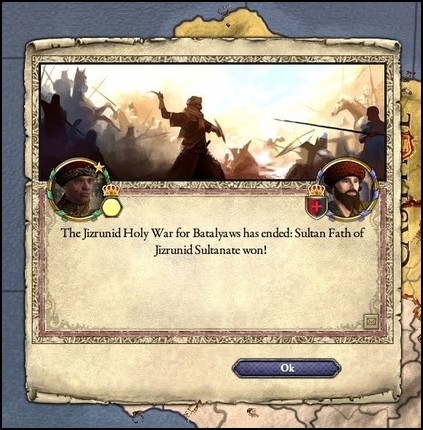
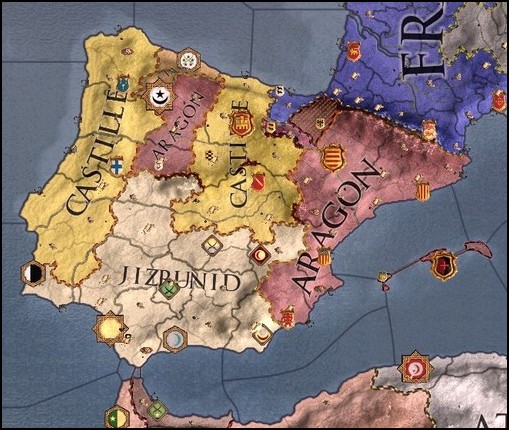
Musa had been born the son of a lowly courtier, but when he returned to Cádiz in the spring of 1230, he was nothing short of a hero. Huge celebrations greeted him as he entered the capital, leading a thousand veteran troops through the gates and down the streets of Cádiz, gradually snaking his way past the markets and mosques and alleyways as crowds pressed in from every direction, shouting and yelling and praying. His victory parade ended at the royal palaces, where a red-faced Sultan Fath embraced him.
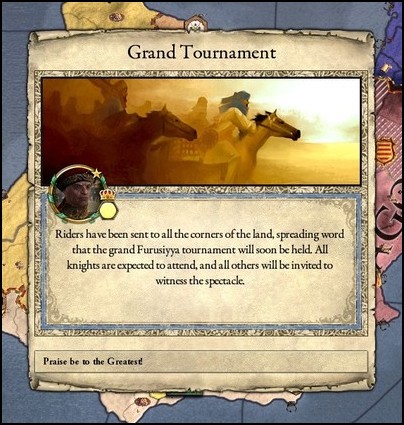
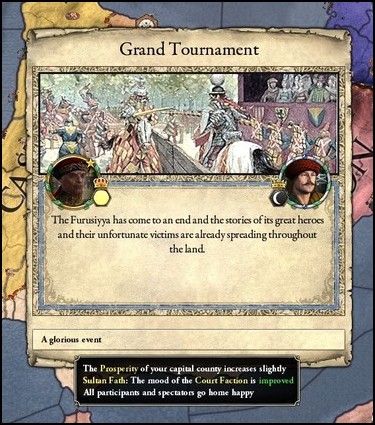
Understandably, Sultan Fath was not very happy. Not only was he seen as a fool for declaring war in the first place, but he was mocked as a coward for abandoning his army in a time of peril, only to be humiliated as Musa led them from one glorious battle to another. Those battles should have been his, those victories should have been his, all that glory and prestige should have been his, or so Fath told himself as he drowned his sorrows in his cups.
He had spent the years of war in a slow descent into alcoholism, which didn’t help with his already-fragile mental state. Whilst Musa led his forces from victory to victory, Fath slowly grew obese on rich foods and wine, spending more and more time in the company of his harem, ignoring his responsibilities as Sultan and drowning himself in pleasure.
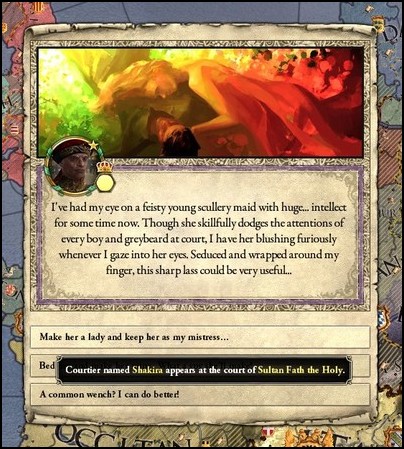
This led to Fath becoming more interested in indulging in personal fantasies than ruling his kingdom, and he became regarded as something of a tyrant. In his weakness, the Council was able to pass several laws empowering and strengthening themselves, something that could come around to bite the Jizrunids when they least expect it.
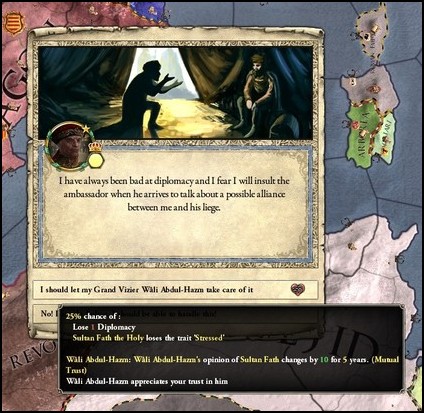
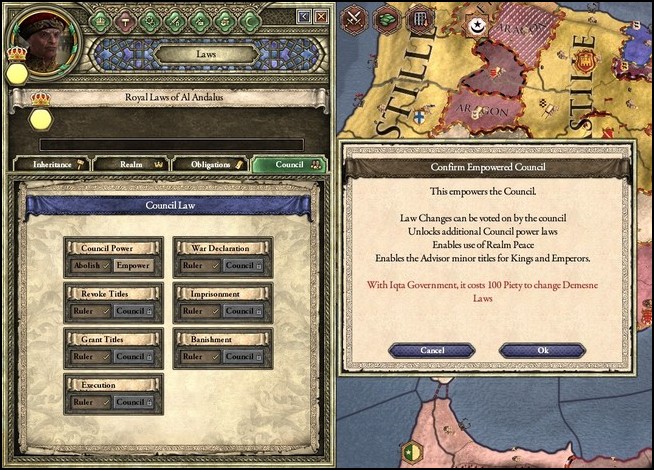
Meanwhile, in the East, a titanic struggle between empires was in full swing.
In Constantinople, a new Basileus had seized power, and he was quickly making a name for himself across the Near East. After brutally stamping out any dissent to his rule, Isaakios led his forces on a brilliant campaign in which he defeated the Armenian Sultanate, recaptured large tracts of land in the Balkans, and conquered significant chunks of southern Italy.
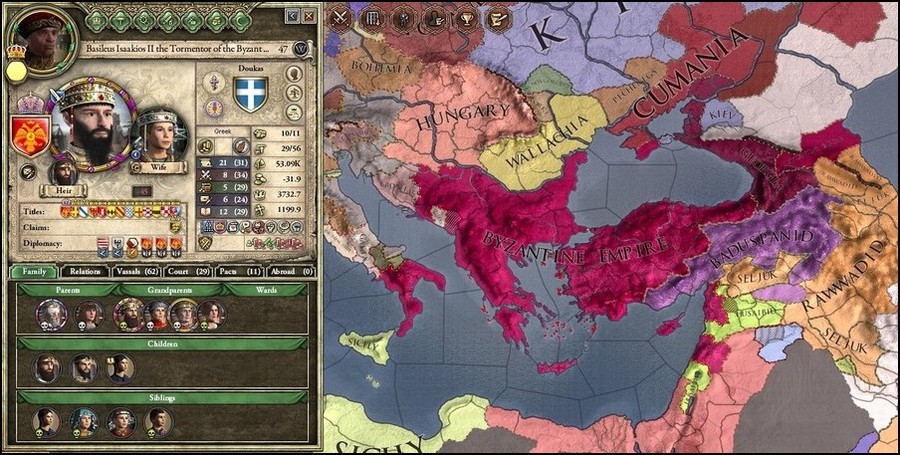
This turned the East Roman Empire from a mere shell of an empire to one of the dominating players of the region, which the Great Khan was… not happy about, to say the least. After sending several envoys demanding that the Basileus submit to him and pay tribute, and enraged Khagan Tolui declared war on the resurgent Roman Empire, vowing to raze the Queen of Cities to the ground.
In a surprising turn of events, however, the Orthodox Christians proved to be firm opponents. In a war fit for legend, the Basileus was able to repel the terrifying Mongol horsemen at the Caucasus, using the rocky mountainous terrain to defeat the pagans in a series of battles.
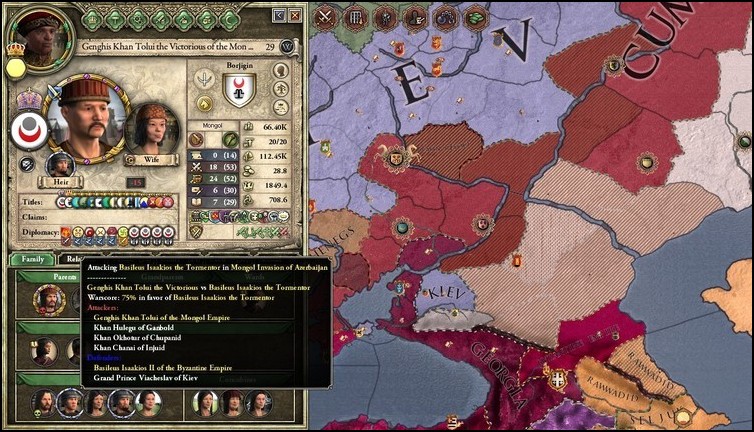
Not long afterwards, the Great Khan himself fell in battle against a rebel horde, stabbed to death during a night raid. For the Mongols, disaster was only followed by disaster, for Tolui's son and presumed heir died just days laters, perishing at the hand of a Persian assassin.
With that, the first proper defeat has been dealt to the Mongol Empire, something that was deemed impossible a short few years past. The Mongols never agreed to a peace, simply because Mongols never surrender, but they lost nonetheless.
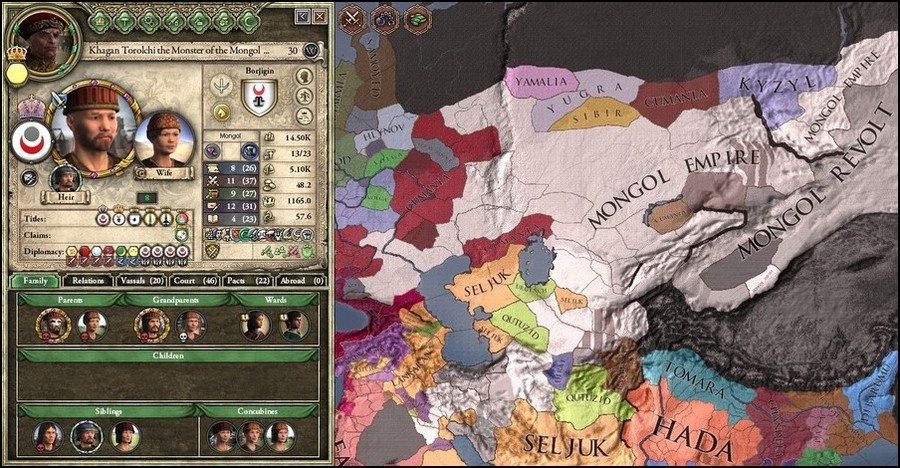
Whilst the greatest land empire in history was engulfed in the flames of revolt, anarchy was gaining traction in Al Andalus as well. Sultan Fath was becoming more unpopular by the day, and it wasn’t just because he was a drunken fool.
No, it was far worse than that. The Sultan had grown dissatisfied with his Council, who were essentially ruling in his name, and so he decided to fire all of his viziers and give their positions to his lovers.
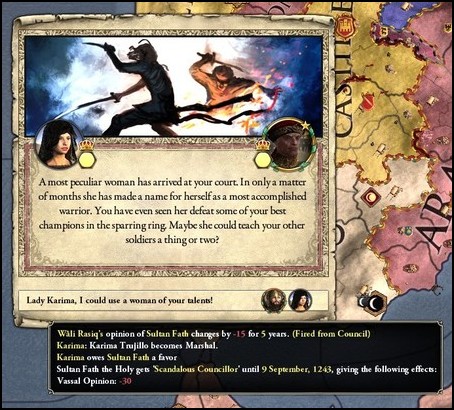
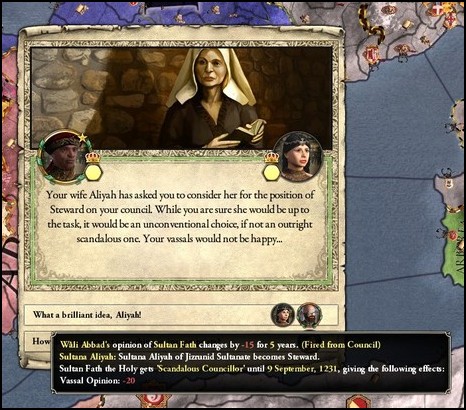
As though his vassals were not already enraged with him, the Sultan also seemed to be taking great interest in the beliefs of heretics and infidels, even going so far as to invite several Zikri and Shia scholars to Cádiz. He blatantly refused to expel them when his council suggested it, even ignoring his sons and heirs when they confronted their father.

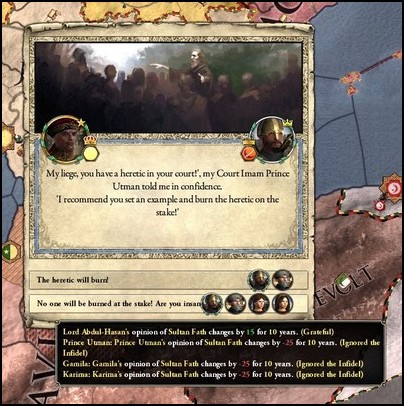
Fath was quickly becoming an object of humiliation and scandal, which is not a good image for the Sultan of Al Andalus, who was supposed to be vigilant and scholarly, strong of body and mind, authoritative and powerful. Not only was Sultan Fath's everyday life becoming court gossip, but he also had a dark side, with rumours quickly spreading about the great pleasure he took in beating his slaves and servants.
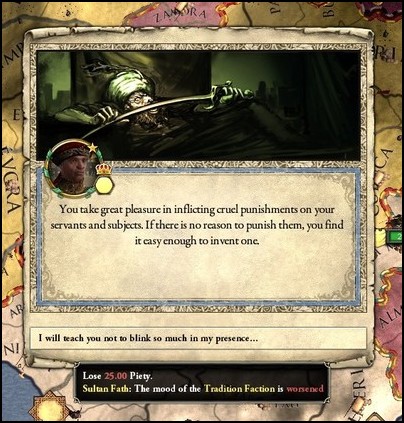
Taking all that into consideration, it isn’t much of a surprise to find that Sultan Fath had enemies, powerful enemies indeed.
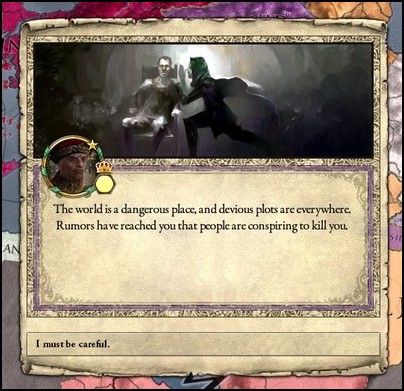
Fath had a lot more to worry about, however, as his physicians informed him that his reckless lifestyle had led to him contracting some strange disease. After a few weeks of feeling unwell, the Sultan slowly began to show a wide array of symptoms, ranging from rapid weight loss to the discolouration of his skin and eyes.

His condition worsened over the course of a few weeks - before long, he was little more than bag of bones and ski, he was vomiting on an hourly basis, and a creeping rot had spread throughout his nether-regions. Eventually, he could take it no longer, and Fath demanded that his physicians do everything they could to heal him of the disease.
The treatment his physicians gave him, however, may not have been what he expected…
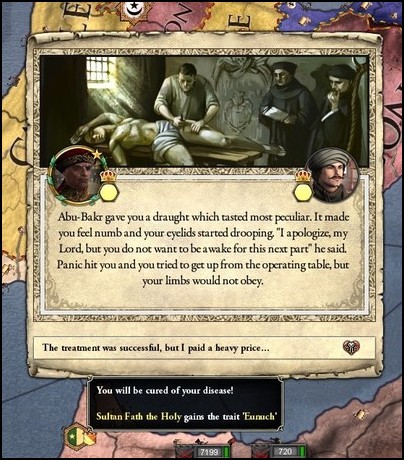
In a procedure gone wrong, the physicians had been forced to part Sultan Fath with his manhood, leaving him in great pain when he finally awoke. Of course, he had them all immediately tortured and executed, but that didn’t give him his love and lust back. Now utterly broken, Fath spent his days drunk, spiralling into desperation and depression.
To make matters worse, infection set into his fresh wound soon afterwards, leaving the Sultan riddled with pustules and flaming rashes.
At that point, the Sultan just wanted the pain to end, to the point where he was willing to take his own life. Luckily for Fath, his vassals detested him almost as much as he hated himself, and were willing to do the job for him.
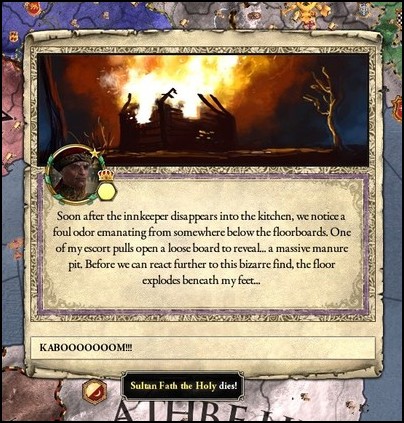
News of the sultan’s assassination quickly spread through Iberia. Within hours of his death, one of Fath’s sons marches into Cádiz and has himself crowned as the new Sultan of Al Andalus, almost as though he knew he his father would die. That, however, is a story for another time.
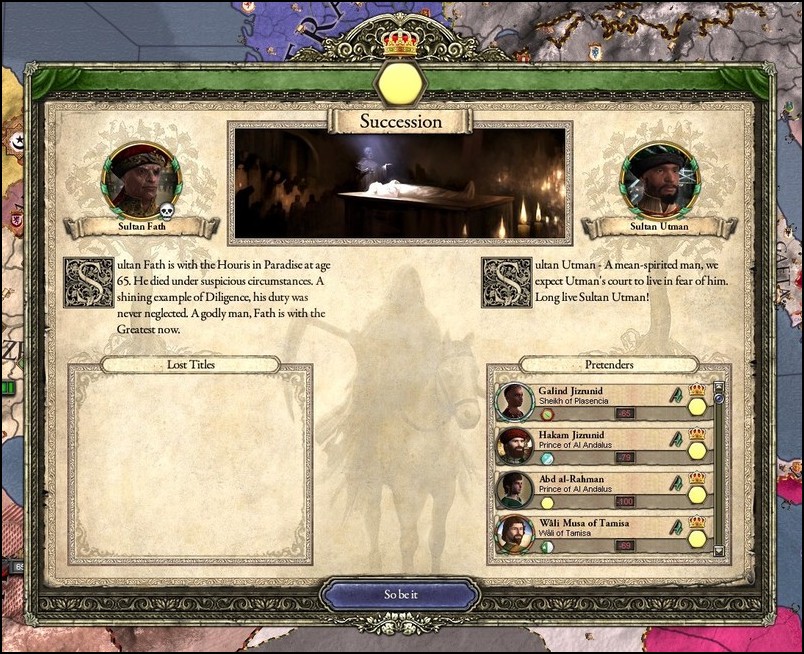
Sultan Fath was, as previously said, an interesting specimen. He wanted what all men wanted: power, glory, fame. He wanted to lead armies onto the battlefield, he wanted to break cavalry charges and slaughter thousands. He wanted soldiers to chant his name and his vassals to bow before him.
In essence, he wanted to be his father. Fear had kept him from all that, however, and the regret had broken him. The man that was blown apart on an afternoon walk was not the man that had been crowned Sultan all those years ago, this man was defeated and finished, all too happy to meet his maker and dance with the devil.